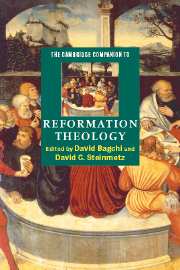Book contents
- Frontmatter
- Introduction
- 1 Late medieval theology
- 2 Lollardy
- 3 Hussite theology and the law of God
- 4 The theology of Erasmus
- 5 Luther
- 6 Melanchthon
- 7 Confessional Lutheran theology
- 8 The theology of Zwingli
- 9 Bucer
- 10 The theology of John Calvin
- 11 John Calvin and later Calvinism
- 12 The theology of Thomas Cranmer
- 13 The theology of the English reformers
- 14 The Scottish Reformation
- 15 An introduction to Anabaptist theology
- 16 Catholic theologians of the Reformation period before Trent
- 17 The Council of Trent
- Conclusion
- Select bibliography
- Index
- Series list
Introduction
the scope of Reformation theology
Published online by Cambridge University Press: 28 May 2006
- Frontmatter
- Introduction
- 1 Late medieval theology
- 2 Lollardy
- 3 Hussite theology and the law of God
- 4 The theology of Erasmus
- 5 Luther
- 6 Melanchthon
- 7 Confessional Lutheran theology
- 8 The theology of Zwingli
- 9 Bucer
- 10 The theology of John Calvin
- 11 John Calvin and later Calvinism
- 12 The theology of Thomas Cranmer
- 13 The theology of the English reformers
- 14 The Scottish Reformation
- 15 An introduction to Anabaptist theology
- 16 Catholic theologians of the Reformation period before Trent
- 17 The Council of Trent
- Conclusion
- Select bibliography
- Index
- Series list
Summary
Even in an age suspicious of grand narratives, the European Reformation has somehow maintained its status as 'a decisive event' in the history of the West. It remains a lively and fascinating subject of study: something of the vitality and variety of fairly current scholarship on the subject - to say nothing of its sheer bulk - can be gauged by English readers from the four volumes of the recent Oxford Encyclopedia of the Reformation. All students of the early modern period, from social and economic historians to historians of art to students of literature, have sooner rather than later to engage with the impact on their field of the Reformation, and especially of its religious ideas. But how does one get to grips with what might strike the beginner as the least concrete aspect of the Reformation? This Companion, with contributions from the leading authorities in the area, is designed to be not only a stimulating collection of essays for theologians but also an accessible and reliable introduction to Reformation theology for non-specialists.
Until recently, it would have seemed eccentric to publish a companion to the theology of the Reformation. Towards the end of the twentieth century, theology came to be seen by many as marginal to Reformation studies. This was in part a reaction to the ‘great man’ approach to the past. In the same way that history in general was no longer primarily about what kings and queens did or what parliaments enacted, so the motivating force of religious history was not to be found in the writings of the ecclesiastical elite. Attention turned instead to the ‘simple folk’.
- Type
- Chapter
- Information
- The Cambridge Companion to Reformation Theology , pp. 1 - 4Publisher: Cambridge University PressPrint publication year: 2004



